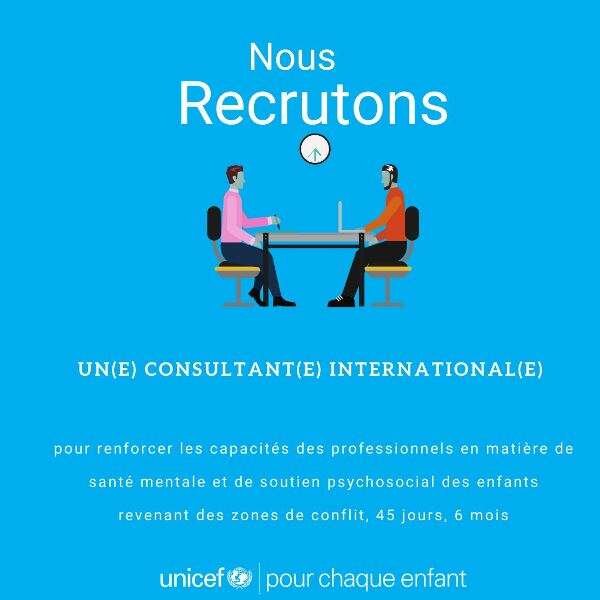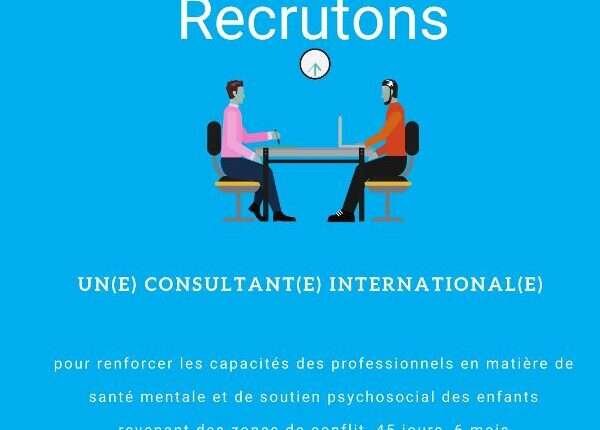UNICEF is hiring
Job no: 553516
Contract type: Consultancy
Duty Station: Tunis
Level: Consultancy
Location: Tunisia
Categories: Child Protection
UNICEF works in some of the world’s toughest places, to reach the world’s most disadvantaged children. To save their lives. To defend their rights. To help them fulfill their potential.
Across 190 countries and territories, we work for every child, everywhere, every day, to build a better world for everyone.
And we never give up.
For every child, a champion
The growing complexity of armed conflicts linked to the fragmentation of armed groups, asymmetric warfare, and the regionalization of conflicts has resulted in an increased presence of foreign fighters in conflicts around the world. At the height of its expansion, the population of the territory occupied by ISIL was close to 8 million and was comprised of nationals of over 80 countries who travelled to this region to support and, in some cases, fight for , armed groups. While the majority of “Foreign Fighters” who traveled to Iraq and Syria were men, they were often accompanied by their spouses and children. Women in some cases voluntarily accompanied their husbands due to their ideological convictions, while others were coerced or mislead. Children largely followed the decision of their parents, as one would expect – and many foreign children were born in Iraq and Syria during the conflict. Some children were recruited and used by the armed groups in various capacities. Regardless of their link or family ties to designated terrorist groups, children should be treated first and foremost as victims of violations of international law and their treatment must be determined with the best interests of the child as the primary consideration, in line with the Convention on the Rights of the Child. This includes actions taken by both public and private actors and in legislative, judicial, and administrative decisions. Children have special rights and protections that apply in all situations, irrespective of the children’s age, sex, or other status, including actual or perceived family or personal affiliation to an armed group.
Children who lived in ex-ISIL controlled territories suffered considerably during the conflict through exposure to horrific scenes of violence, being forced or convinced to commit violent acts, surviving conflict related sexual violence, losing parents, family members, or friends to fighting, and many other deprivations.
For children though, the suffering has not ended with the end of war. Since the defeat of ISIL in early 2019, thousands of foreign children from more than 60 countries with alleged or actual links or family ties to designated terrorist groups have been living in the camps and detention facilities in northeast Syria and Iraq. More than 50 per cent are under the age of five and 90 per cent under the age of 12. Boys above the age of 12 are often separated from their caregivers and imprisoned. The conditions of the camps and facilities are not sustainable, as children remain deprived of their liberty and education with limited access to food, medical care, clean water and other basic services and are at heightened risk of violence, exploitation, and abuse. There is an urgency for Member States to repatriate their child nationals and provide them with protection and reintegration support that is human rights-based, age-appropriate, and gender responsive. It is critical that these services for children are provided through national and international child welfare, social service and juvenile justice frameworks, and outside of security and counterterrorism frameworks which can result in further stigmatization and distrust within the communities they are reintegrating.
The Committee on the Rights of the Child recommends the Tunisian State to “redouble its efforts to repatriate children born to Tunisian terrorist fighters involved in armed conflicts abroad, with a view to ensuring their protection, recovery and reintegration, and ensure that all child victims of offenses covered by the Optional Protocol receive immediate, child-friendly and gender-sensitive assistance for their physical and psychological recovery and social reintegration , paying particular attention to children who have been victims of sexual and gender-based violence during hostilities”.
Between 2018 and 2022, around 50 children and their families came back from Libya and Syria. To ensure their smooth reintegration, the Child Protection Office and UNICEF organized a series of workshops to gather all stakeholders to discuss the matter and lessons learned. As a result, a national intersectoral guideline on the reintegration of those children was developed and is currently being finalized.
How can you make a difference?
Through this consultancy, UNICEF aims to provide support to the government of Tunisia to strengthen the capacity of stakeholders to facilitate successful reintegration of children and their families, by understanding specific psychosocial and mental health needs of children and addressing them.
Specific objectives include:
-
- In alignment with UNICEF’s Global MHPSS Multi-sectoral Operational Framework, develop training package to strengthen capacity of stakeholders in dealing with children returning from conflict zone:
- Psychologists: In depths training package
- Social workers: basic MHPSS foundational skills and inter-disciplinary approach,
- Judges: overall orientation on the impact of various experience of children in conflict zone.
- Roll out the training in three zones (North, Central and South).
- In alignment with UNICEF’s Global MHPSS Multi-sectoral Operational Framework, develop training package to strengthen capacity of stakeholders in dealing with children returning from conflict zone:
Expected results will be a training package contextualized to the Tunisian context but that can also be duplicated in other countries in the region. Approximately 100 stakeholders will be trained nationwide. A final report that includes recommendations for the improvement of the provision of MHPSS to children will also be provided.
To qualify as an advocate for every child you will have…
- Advanced university degree in social science, psychology or other relevant fields;
- At least 8 years’ relevant work experience, in developing child protection MHPSS frameworks, SOPs and curriculum / training development;
- Experience working with MHPSS in Children associated with armed forces and groups (CAAFAG) programs
- Excellent communication and drafting skills in English, French or Arabic both orally and in writing;
- Strong interpersonal skills and experience in training and capacity-building initiatives and advisory functions;
- Prior experience of working with UNICEF and Governments in development contexts will be an asset.
For every Child, you demonstrate…
- UNICEF’s values of Care, Respect, Integrity, Trust, and Accountability (CRITA).
To view our competency framework, please visit here.
UNICEF is committed to diversity and inclusion within its workforce, and encourages all candidates, irrespective of gender, nationality, religious and ethnic backgrounds, including persons living with disabilities, to apply to become a part of the organization.
UNICEF offers reasonable accommodation for consultants/individual contractors with disabilities. This may include, for example, accessible software, travel assistance for missions or personal attendants. We encourage you to disclose your disability during your application in case you need reasonable accommodation during the selection process and afterwards in your assignment.
UNICEF has a zero-tolerance policy on conduct that is incompatible with the aims and objectives of the United Nations and UNICEF, including sexual exploitation and abuse, sexual harassment, abuse of authority and discrimination. UNICEF also adheres to strict child safeguarding principles. All selected candidates will be expected to adhere to these standards and principles and will therefore undergo rigorous reference and background checks. Background checks will include the verification of academic credential(s) and employment history. Selected candidates may be required to provide additional information to conduct a background check.
Remarks:
Only shortlisted candidates will be contacted and advance to the next stage of the selection process.
Individuals engaged under a consultancy or individual contract will not be considered “staff members” under the Staff Regulations and Rules of the United Nations and UNICEF’s policies and procedures, and will not be entitled to benefits provided therein (such as leave entitlements and medical insurance coverage). Their conditions of service will be governed by their contract and the General Conditions of Contracts for the Services of Consultants and Individual Contractors. Consultants and individual contractors are responsible for determining their tax liabilities and for the payment of any taxes and/or duties, in accordance with local or other applicable laws.
The selected candidate is solely responsible to ensure that the visa (applicable) and health insurance required to perform the duties of the contract are valid for the entire period of the contract. Selected candidates are subject to confirmation of fully-vaccinated status against SARS-CoV-2 (Covid-19) with a World Health Organization (WHO)-endorsed vaccine, which must be met prior to taking up the assignment. It does not apply to consultants who will work remotely and are not expected to work on or visit UNICEF premises, programme delivery locations or directly interact with communities UNICEF works with, nor to travel to perform functions for UNICEF for the duration of their consultancy contracts.
- Advertised: W. Central Africa Standard Time
- Deadline: W. Central Africa Standard Time
#job #emploi #recrutement #recruitment #hiring #careers #marketing #innovation #digitalmarketing

N’hésitez pas à partager autour de vous 😉










